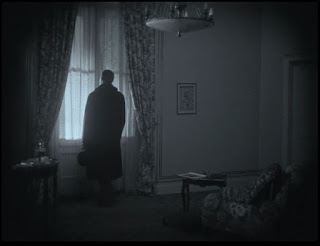I saw this film as part of last year’s BFI Weimar Season but couldn’t resist the chance to see the restored version again, with tints and crystal clarity, and also to “remaster” my own thoughts on a film that gets less attention than most of Pabst's output. Made between The Love of Jeanne Ney and Pandora’s Box it certainly has neither the dramatic sweep of the former nor the mythic intensity of the latter, but it’s nearly on a level in subtler ways. There's always less at stake but the enduring happiness of two - or more - people is always watching out for.
The director turns what could have been a light romantic
tale into an intense psycho-drama that plumbs the depths of naughty, bawdy,
gaudy, snorty Berlin club culture in ways that are less dramatically extreme
but all the more believable. The film was entitled The Devious Path for
the English market but the Giornate’s director Jay Weissberg is not alone in
prefering the literal translation of A Stray which is far less
judgemental and more reflective of the film’s point.
Pabst certainly brought out the very best of Brigitte Helm as he did with a nervy Garbo and a fearless Brooks, with a mix of instruction, editing and the flying camerawork of Theodor Sparkuhl, who’s camera “…is as unchained as Brigitte Helm’s character...” especially as it moves in the midst of her wild dancing at the nightclub, inhibitions all lost. Helm is almost ever-present and we see every delicate transition as she flits from intense frustration to anger, from desire to fear, hate to love… her body thrown into acute angles just as her unique features shift through gears most of us don’t have. She’s the only thing really happening in the film which is a minimalist story of suburban disconnection stirring horrific extremes in her character Irene Beck.
 |
| Brigitte |
Pabst digs into her portrayal and the tension is not just surface but disturbed. Helm was a relatively inexperienced actress at this point, just one year on from Maria but she had already worked with Pabst on Jeanne Ney and there was obviously a connection with the actress willing to commit so much. Occasionally she over-steps but quickly corrects and is always inhabited by the moment; a true “silent actress” supple and sensuous whether tortured or teasing.
But yes, Gustav Diessl is also in it as her neglectful husband Thomas and he’s full of dark-eyed tricks of his own. He too can transmit mixed signals and come over all doe-eyed destroyed seconds after being in control… he’s a very shadowy presence next to Brigitte’s shining light but… casting, lighting, directing will all do that for you.
 |
| Brigitte Helm and Gustav Diessl |
Thomas is married to his work and won’t show Irene
much attention let alone a good time and their union has hit the rocks
at just the wrong point. Irene is much too much to not be noticed and artist
Walter Frank (Jack Trevor) can’t help but to draw her and to be drawn to her… constantly sketching
his affection in a studio dominated by her image. Irene and Walter plan an
escape but Thomas spots the clues and arrives just in time to bring his wife
back.
Irene is not to be constrained and breaks away to find her friends, led by Liane (Joyless Street’s Hertha von Walther) in a nightclub. This “den of iniquity” as Councillor Möller (Fritz Odemar) calls it, offers all kinds of temptation and as Irene sits knocking back the champagne her eye is caught by a lone woman, Anita Haldern (Ilse Bachmann). Eventually she follows her behind a curtain emerging somewhat refreshed by powders unknown as Pabst ticks off as many illicit activities as he can.
 |
| Off to the powder room... |
Irene dances, flirts with a boxer Sam Taylor (Nico Turoff) –
who couldn’t be more different than Thomas, and makes sure Walter also sees her
independence. It’s a heck of a night and Sparkuhl’s camera draws us, hand-held,
into the heart of the action, inebriating the viewer with images.
No less impressive is the scene once Irene gets home to find
Thomas lying still in the darkness; the couple re-unite and all seems forgiven
until Thomas spots the very odd hairy-chested man-doll Irene had been given at
the club. It doesn’t look much to me but as a token of unabashed male sexual
interest it’s clear enough to him. The row resumes and the new dawn fades…
Irene now begins a liaison with Boxer Sam who we see soaring in a display of the animalistic masculinity Thomas does not provide, and as he asks Walter to draw her picture, it looks like artist vs athlete unless Thomas the Accountant can intervene…
Ultimately the “devious” path is more about truth and
fidelity than sex, drugs and nightclubbing and is very engaging, emotionally
heightened cinema that relies on the depth of feeling rather than drama. It
looks sensational partly because both Brigitte and Gustav do, and this new
restoration, first shown at the 2018 Berlinale shows this off to maximum
effect.
Local lad, Mauro Colombis, sent his recorded accompaniment from Australia, and it matched Pabst’s tonal subtlety in ways that were unexpected with rich melodic lines that were perfectly attuned to the torments and sweeping desired on screen. This online Limited Edition of Le Giornate has served to highlight the players more than usual and whilst a virtual audience can never match the atmosphere of a live one, spirits across the globe must have been lifted by this new combination of music and movement.









+colour.png)









No comments:
Post a Comment